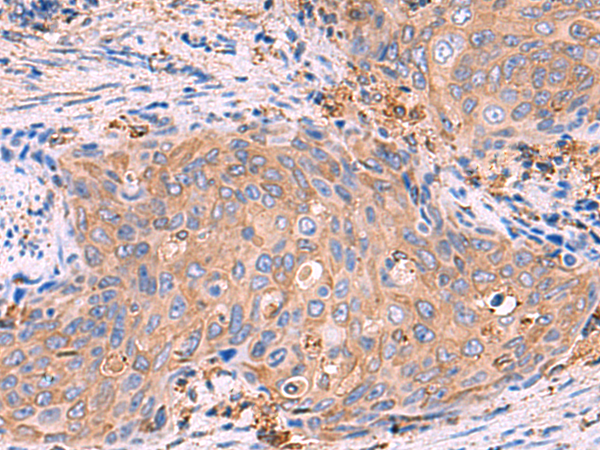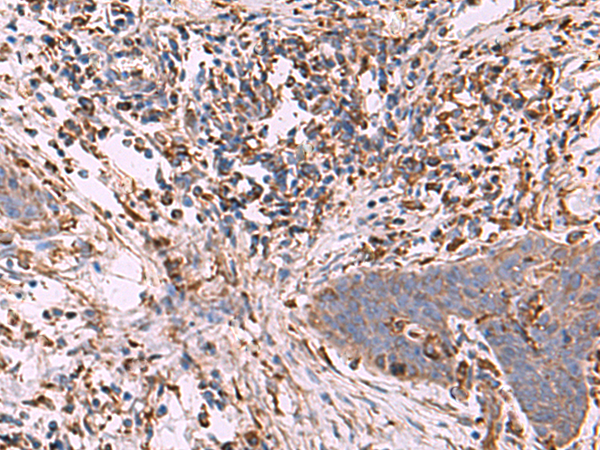

| WB | 咨询技术 | Human,Mouse,Rat |
| IF | 咨询技术 | Human,Mouse,Rat |
| IHC | 1/70-1/350 | Human,Mouse,Rat |
| ICC | 技术咨询 | Human,Mouse,Rat |
| FCM | 咨询技术 | Human,Mouse,Rat |
| Elisa | 1/5000-1/10000 | Human,Mouse,Rat |
| Aliases | G6PC; G6PT; GSD1; GSD1a; G6Pase |
| Host/Isotype | Rabbit IgG |
| Antibody Type | Primary antibody |
| Storage | Store at 4°C short term. Aliquot and store at -20°C long term. Avoid freeze/thaw cycles. |
| Species Reactivity | Human, Mouse, Rat |
| Immunogen | Synthetic peptide of human G6PC1 |
| Formulation | Purified antibody in PBS with 0.05% sodium azide and 50% glycerol. |
+ +
以下是关于G6PC1抗体的模拟参考文献示例,供参考(建议通过学术数据库核实具体文献):
---
1. **文献名称**:*Development of a Monoclonal Antibody Specific for Human G6PC1 and Its Application in Glycogen Storage Disease Type Ia Diagnosis*
**作者**:Chou JY, Mansfield BC
**摘要**:本研究报道了一种针对人类G6PC1蛋白的单克隆抗体制备,并通过免疫印迹和免疫组化验证其特异性。该抗体成功用于GSD1a患者肝组织样本的蛋白表达缺失检测,为临床诊断提供了可靠工具。
2. **文献名称**:*Structural Characterization of G6PC1 Using Antibody-Based Epitope Mapping*
**作者**:Martin CC, Burlina AB
**摘要**:通过抗体表位定位技术解析G6PC1的构效关系,揭示了其催化活性区域的关键表位。研究证实所开发的抗体可特异性识别G6PC1的胞内结构域,为酶功能研究提供分子工具。
3. **文献名称**:*Altered Hepatic G6PC1 Expression in Diabetic Mouse Models Detected by Novel Polyclonal Antibodies*
**作者**:Ghosh A, O’Doherty RM
**摘要**:开发多克隆抗体用于检测糖尿病小鼠肝脏中G6PC1的表达变化,发现胰岛素抵抗状态下G6PC1表达显著上调,提示其在高血糖病理机制中的作用。
4. **文献名称**:*G6PC1 Antibody-Based Assays for Evaluating Enzyme Replacement Therapy in GSD1a*
**作者**:Arion WJ, Pan CJ
**摘要**:利用抗G6PC1抗体建立定量检测方法,评估基因治疗中小鼠模型肝细胞酶活性恢复效果,证实抗体在治疗监测中的应用潜力。
---
建议通过PubMed或Google Scholar检索关键词“G6PC1 antibody”、“G6PC1 immunoassay”等获取真实文献,并优先选择近年高被引研究。
**Background of G6PC1 Antibodies**
G6PC1 (glucose-6-phosphatase catalytic subunit 1) is a key enzyme in glucose homeostasis, primarily expressed in the liver, kidney, and pancreatic islets. It catalyzes the final step of gluconeogenesis and glycogenolysis by converting glucose-6-phosphate to free glucose, a critical process for maintaining blood sugar levels. Dysregulation of G6PC1 is linked to glycogen storage disease type Ia (GSD1a or von Gierke disease), caused by mutations in the *G6PC1* gene, leading to severe hypoglycemia and metabolic complications.
Antibodies targeting G6PC1 are essential tools for studying its expression, localization, and function in metabolic pathways. They enable the detection of G6PC1 protein levels in tissues via techniques like Western blotting, immunohistochemistry, and immunofluorescence. Such antibodies are also used in research exploring metabolic disorders, diabetes, and insulin resistance, where altered G6PC1 activity may contribute to pathophysiology.
Additionally, G6PC1 antibodies aid in investigating therapeutic strategies for GSD1a, including gene therapy and enzyme replacement. Their specificity ensures accurate assessment of experimental outcomes in preclinical models. Overall, these antibodies play a pivotal role in advancing understanding of glucose metabolism and developing targeted interventions for related diseases.
×